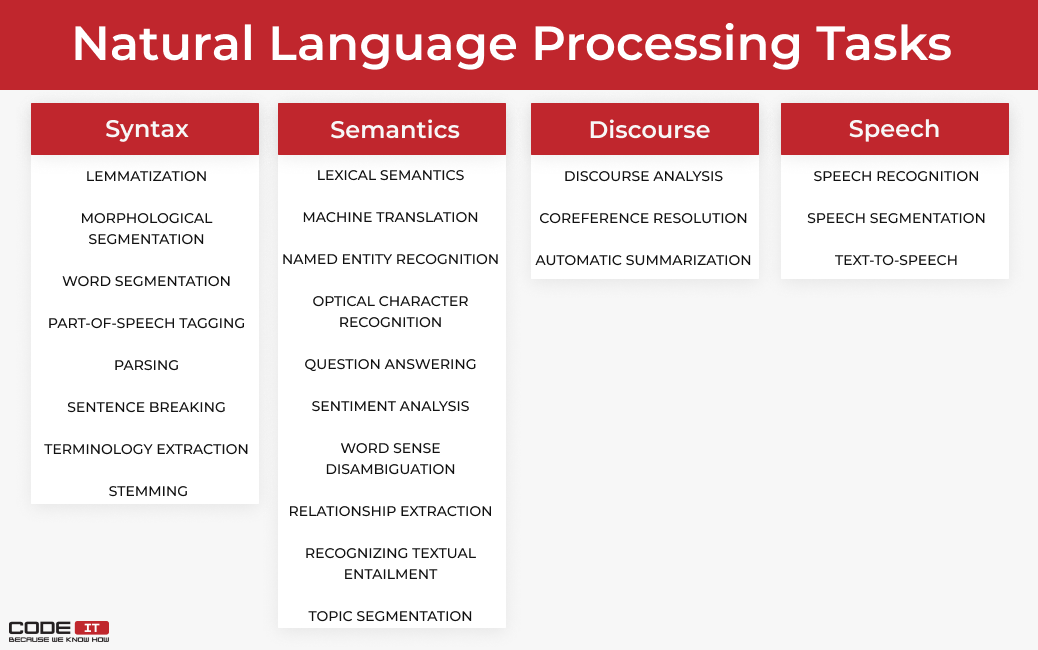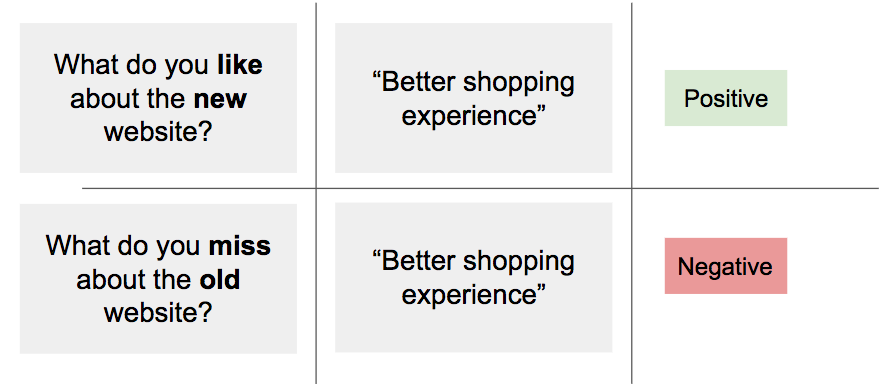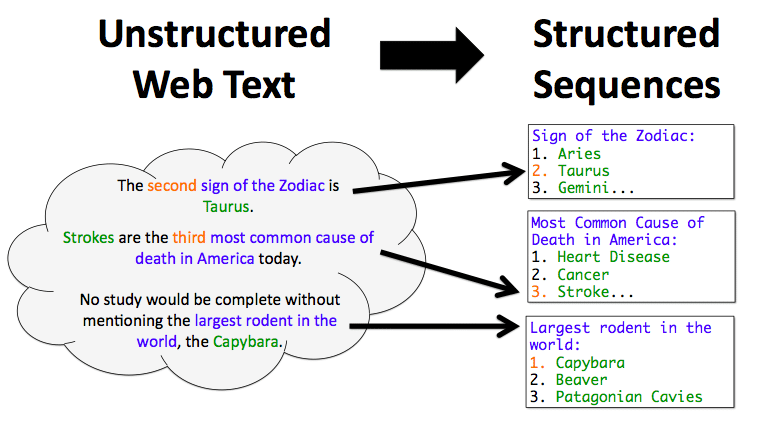NLP Applications in Business


What is Natural Language Processing Used For?
This technology has been around over the years and continuously improved the life quality of people from all walks of life or industries especially in the field of business. Natural Language Processing (NLP) is an integral area of computer science of artificial intelligence—a way of communication via speech, text, virtual conversation and messaging or, putting it simply, the combination of artificial intelligence and computational linguistics.
The term was coined back in 1956: since then, Artificial Intelligence (AI) has been used in computer systems to think and learn much like people do, and there were several attempts to replicate human thought processes and actions within AI application.
As part of AI, machine learning first helped revolutionize natural language processing in the late 1980s. With machine learning at hand, computers used statistical methods to grasp learning on its own by being constantly introduced to new or different data without direct programming. Over the years, statistical modeling techniques such as Hidden Markov Models were used to convert speech to text by performing mathematical calculations in order to determine what was spoken.
There are two main areas of natural language processing. One is where the computer assigns the meaning of language it has received, which is called Natural Language Understanding (NLU), and the other one is where the process converts the information gathered from the computer’s language to human language also known as Natural Language Generation (NLG).
How NLP Works?
Converting written or spoken human speech into an acceptable and understandable for computer form are natural language processing techniques that are deemed effective and highly valuable for businesses.
NLP business applications are used so commonly these days in different forms and a few of NLP examples are spell checkers, online search, translators, voice assistants, spam filters, autocorrect and many more.
There are different natural language processing researched tasks that have direct real-world applications while some are used as subtasks to help solve larger tasks. Here’s a list of the following most common tasks in NLP.
Natural Language Processing Tasks:
Syntax – this is the one responsible for the grammatical structure of the text. Syntax involves the identification of a word’s intended meaning from a dictionary also known as lemmatization and morphological segmentation or the splitting of words into morphemes while classifying them. Aside from that, word segmentation, part-of-speech tagging, parsing, sentence breaking, terminology extraction, and stemming are all parts of the syntax task.
Semantics tasks that use logic and linguistics to identify and establish the meaning of a text. This involves lexical semantics with which the computational meanings of a word in context are determined. Aside from that, it also includes machine translation for translating one language to another, named entity recognition for the identification of maps object to proper names, optical character recognition for the conversion of image printed texts into readable formats in the computer, question answering, sentiment analysis for emotion assessments, word sense disambiguation for identifying multiple possible meanings of a particular word, relationship extraction, recognizing textual entailment, and topic segmentation.

Discourse – responsible for the adoption of the linguistic definition of words used in longer sentences. This includes discourse analysis which institutes the role sentences play in larger forms of text by referencing the different sentences used. It also involves coreference resolution, which identifies the words correlated to the same objects in the text and automatic summarization.
Speech – This task deals particularly with language that is used in audio formats. This includes both speech recognition and text-to-speech processes wherein speech used is converted into text format. It also uses speech segmentation wherein intelligible words are separated into sequences.
Top NLP Use Cases in Business
1. Machine Translation – One of the widely used applications of deep learning in NLP is machine translation. With this, automatic translation developed in computer algorithms is possible without getting humans involved in the process. This then highly affects businesses when translating low-impact content such as product reviews, regulatory documents, and emails quickly. The best-known applications for machine translation are Google Translate and Amazon Translate.
2. Speech Recognition – It may have been around for a long time now but only in the last few decades it has achieved significant success with different software programs decoding the human voice using mobile telephony, home automation, hands-free computation, virtual assistance, video games and many more. Speech Recognition tools that were developed with the aid of Natural Language Processing is widely applied in companies as they create intelligent voice-driven interfaces for chosen systems in their field of business.
SPEECH RECOGNITION TECHNOLOGY IN HEALTHCARE
3. Sentiment Analysis – It tackles people’s inclination about certain topics or services making this option helpful in various businesses. It is responsible for checking whether goods or services satisfy customers, create polls for brands and even political candidates. This does not just help companies acquire knowledge on how customers perceive them but also allows for improvement in concepts, products, marketing, and advertising while reducing the level of dissatisfaction.

4. Question Answering – Questions by humans using natural language can have answers provided by question answering wherein this NLP application identifies the speech given and formulates a response in return. Examples of question answering applications are Siri, OK Google, and Virtual Assistants.
5. Chatbots – They proved to be able to handle standard tasks. Chatbots are highly efficient in both business and consumer sides helping answer various queries when needed. However, businesses today push further into developing chatbots so that they could communicate on a human level in all its complexity. Chatbots are helpful for business when it comes to improving customer experience and satisfaction.
6. Spam Filters – A common use case of Natural Language Processing are Email Filters. This functions blockers for unwanted emails filtering out those that are non-spam from spam emails by extracting the meaning and frequency of certain words detected in the body of an email.
7. Information Extraction – A Natural Language Processing system that aims to gather and extract collated relevant information in a quick manner that can be used efficiently in the development and improvement of various businesses. Information extraction makes use of unstructured data from social media conversations, emails and interactions with customer service representatives and converting it into accessible data facilitating the decision making of businesses through advanced algorithms and software applications.

In What Business Area Can You Apply NLP?
Hiring and Recruitment – By using natural language processing in hiring and recruitment, candidate searches are sped up by filtering and sifting through resumes of applicants that meet the job requirements. With a bias-proof, gender-neutral and relevant synonyms of keywords for the job description by NLP-based software, recruiters can maximize the number of job applicants without potential good candidates being neglected in the search process.
Advertising – Natural language processing helps in the identification of new audiences that are potentially interested in certain products. With the use of NLP software, the range of channels for ad placements can be broadened which then helps the company maximize and use their budget wisely especially when using simple keyword machine routine.
Customer Service – NLP-powered chatbots can provide customer service by answering routine questions and handling simple requests. This allows increasing customer satisfaction, especially that chatbots provide swift help in personalized conversations and partially replacing humans in simple scenarios importantly providing customer support at any time of the day.
Healthcare – With the help of health IT systems in the healthcare industry, providers and doctors are accompanied by reduced subjectivity in decision-making and providing relevant medical knowledge. There are many ways NLP is of help in the healthcare industry. With NLP, data retrieval of patients is simplified and sped up making it easier to access medical information. Aside from that, it also helps healthcare providers and doctors make accurate decisions when it comes to treatment and diagnosis with the help of predictive models.
Market Intelligence – Staying relevant in the market can be challenging but with NLP-based, advanced tools, companies can filter through numerous blogs, websites, social media posts to be updated with the current trend and what’s going on in respective industries. Insightful data can also be acquired thereby strengthening the company’s business and reducing dissatisfaction from potential customers.
In a nutshell, NLP-based applications are important and relevant in all businesses these days. Programs incorporating machine learning and NLP make insights, that were once hidden in unstructured data, more feasible. Most importantly, it helps the business enhance the customer experience while maximizing productivity for every company.
Build your ideal
software today

